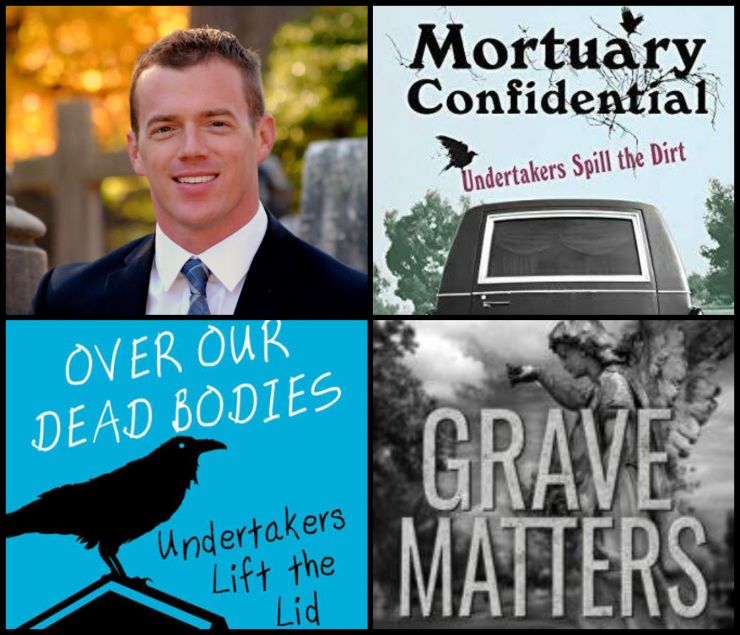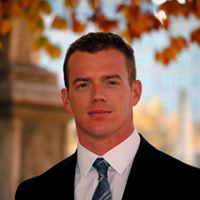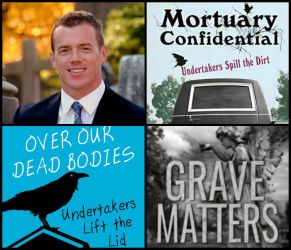Apr 18, 2017

‘It’s my Muse’: Author and Funeral Director, Todd Harra, Discusses the Connection Between Funeral Directing and Writing
The perspective of a funeral director is rarely explored in the literary world. While many professions have become demystified in recent years, the funeral home remains a largely overlooked setting and the funeral director has been relegated to small, supporting roles in the few stories they appear in. This is an unfortunate deficit because there is such a wealth of fascinating and largely unexplored subjects within the work of funeral directors. Creating authentic characters and accurate descriptions of this unique profession requires credibility that only a funeral director writer can offer.
Funeral directors who are gifted with the written word have the unique ability to draw from personal experiences while shedding light on issues other writers cannot tackle. Their prose resonates with a combination of memorable imagery and rich characterization. This is mainly because the funeral writer has the authority to address a wide range of subjects, both somber and humorous, from a perspective no other writer can offer.
This week, we had an opportunity to interview Amazon bestselling author, Todd Harra, about how his work as a funeral director inspires his writing. Todd works for the family business, McCrery & Harra Funeral Homes and Crematory, in Wilmington, DE. They have been clients of ASD since 2000. Todd and co-author, Ken McKenzie, published Mortuary Confidential: Undertakers Spill The Dirt (2010) and Over Our Dead Bodies: Undertakers Lift the Lid (2014), featuring stories and anecdotes that illuminate the work and daily lives of funeral professionals. With his new fiction novel, Grave Matters, Todd is now giving a voice to funeral directors in the mystery crime genre. You can purchase Todd’s books anywhere books are sold. Connect with him at www.toddharra.com or on Facebook @toddharraauthor.
1. Congratulations on the publication of your new novel, Grave Matters. In addition to Grave Matters, you’ve also co-written two other
books filled with both poignant and funny stories based on your experiences as
a funeral director. Can you share with me what readers can expect from
Grave Matters and how it compares to and differs from your other
publications?
Grave Matters is my first serious foray into fiction. It’s a mystery with an
undertaker (surprise!) as the protagonist. The nice thing about fiction is
there’s plenty of wiggle room, so I had artistic license to use a bit more
latitude than I did with
Mortuary
Confidential
and Over Our Dead Bodies
which I co-wrote with Ken
McKenzie
.
When
writing
MC and OODB Ken and I had to use a lighter touch because of the subject
matter, death and grieving, so as not to come across as crass. We worked really
hard to present the material in a light-hearted way so it wasn’t too heavy
either. It was a balancing act, but I do believe we were able to pull it off. With
Grave Matters, I had none of those
restrictions so I was able to roll up my sleeves and dig deep.
I’m
happy with the finished product, and readers of the genre will be too. It has
all the elements of a good mystery: the protag is flawed, the setting is sexy,
and the plot is filled with murder, drugs, and intrigue. Hopefully, if I’ve
done my job right, the reader won’t want to put it down until they’ve solved
the murder.
2. Your first two books were based on real stories you’ve witnessed
as a funeral director, but your new book is fictional. Which type of literature
do you prefer writing? Why?
Nonfiction
is certainly easier for me to write because it happened, I just have to present
the material in an interesting, engaging way. I’m not creating the story, just
putting it down on paper.
I
liken the plotting of a fictional book to wrestling a bear into a cage. The
different directions you can take the characters and plot are endless, and it
can be almost overwhelming. Outlining has really helped focus my writing. I
tried it for the first time, and to be honest, that’s the hardest part. Once I
created the “roadmap” it’s no problem to sit down and type out the actual
words.
I
worked with two really great editors on this project who really helped me with
the craft of genre fiction (in this case: mystery) and their advice boils down
to that famous quote by Alfred Hitchcock,
“Drama is life with the dull bits cut
out.”
I have a tendency to over explain; once I cut all the gristle from my
drafts it really helped shape up the narrative and increase the pace.
At the
end of the day I prefer fiction writing more because I feel like I have more
room to move around, whereas with nonfiction you need to stay true to the
facts, even if they’re boring. Good fiction should never, ever be boring.
3. With Grave Matters being your solo debut, can you tell me
how your writing process has changed since working with co-author Kenneth
McKenzie on your two other books?
My
process hasn’t really changed. The division of labor in our previous projects
was Ken would gather the material, essentially go out and cull the stories—the
material—because he has a lot of contacts from his calendar,
Men of
Mortuaries, and he would do the
lion’s share of the marketing. My job was to lay out and write the book. I’m
content to stay behind the scenes and write, and Ken is a promotional machine.
That’s why our partnership worked so well, our assorted talents added up to
what’s necessary to effectively bring a book to market.
4. In Grave Matters, are your characters based off real people or did they all
come entirely from your imagination?
(Laughs) I think that’s the most frequently asked
question! The short answer is: they’re all made up. The one of the greatest
things about the profession is the variety of people we funeral directors get
to interact with on a daily basis. I’m sure all of the unusual character traits
I’ve encountered in the past twelve plus years have seeped into the bedrock of
my psyche and I pull them out and combine them into memorable, interesting, and
certainly flawed characters.
5. What was your favorite chapter (or scene) to write and why?
The
chapter where Clip (the protag) and his apprentice, Nikki, fish Bubba Duckworth
out of the Wando River where he’s been floating for five days. It’s interesting
to me to explore things that aren’t as they seem. Was Bubba’s death a murder, an
accident, or suicide? That scene was the second scene in the first draft (and
the first scene I wrote), but one of my editors told me I needed to have a murder
prior to that, so I moved it back. It’s so unlike the first seemingly
accidental death Clip stumbles across, but I hope it gets the reader thinking
how is he going to tie all this together?
What I really like about that scene on the
boat ramp is it’s one of the few times I assemble so many of the main
characters in the same place, and seeing what their differing agendas are, and
how they assess the situation, especially through the lens of Clip’s new
apprentince.
6. How does your work as a funeral director influence your writing?
It’s my muse. There’s so much rich subject matter relating to the profession
that Ken and I plumb in MC and OODB. With all the unique people, scenarios, and
emotions I (and funeral directors everywhere) deal with on a daily basis, I’m
never at a loss for ideas. I am very careful to filter those ideas, and change
them if necessary, because I’m certainly not out to profit from somebody else’s
grief. But I love the profession because I’m meeting and interacting with
different people, and am in different places every single day. No two days are
alike, and that fuels my imagination.
7. As a funeral director, how do you carve out the time you need
for writing?
Most of the men and women reading this are well aware of a funeral
director’s schedule. I don’t really think of it as a schedule; it’s more of a
lifestyle. I try to write, something, anything, every day. I’m usually able get
some time in the evening after I put the kids to bed. The goal is a thousand
words a day, but sometimes I’m so exhausted I’m lucky to tap out fifty words.
But it’s important to make it part of the routine if you’re a serious writer. In
my opinion there’s no such thing as bad writing while you’re working on a first
draft. It can all be reworked in the revision stages, so I’m satisfied if all I
have that day is fifteen minutes to spare, and I can only get out a few
sentences. I’ve met the goal of writing for the day, even if I fell 950 words
short of a thousand.
8. On average, how much time a day are you able to devote to
writing?
If
it’s a work day, I can usually set aside an hour. On days off, I can sometimes
devote as much as two hours a day to the craft. When I was single, I was able to
devote a lot more time, but these days I just have to manage my time better.
While
I’m actively editing or completing a book, I’ll typically have to spend more
time because there are deadlines to be met, decisions to be made, and lots and
lots of emails to field about the project, typically with the editor.
9. How long does it take you to write a book?
It
typically takes a year for me to write a book from idea to finished first
draft. There’s still a lot of work to be done after the first draft is
finished, but it’s a different kind of work. While I’m editing, I’ll typically
start another project. It gives me a nice distraction as well as time to think
as I flip flop back-and-forth between projects.
When
I’m writing fiction, I plan the book (in the form of an outline), write it, and
then revise. With nonfiction, I’ll write it, and then organize it before
revising. Our agent was instrumental in helping us shape the flow of
MC and OODB into something more cohesive. When I submitted the original
version of
MC to our agent, at the
time it was essentially just short stories. Our agent helped us organize it so
there was an overall narrative and give it some structure. What a lot of
readers are unaware of is the time it takes for an accepted manuscript to hit
the shelves. From the time you sign with a publishing house, until your book
comes out the process typically takes 18 months. It was about a three years process
from idea to book-in-hand for
MC, and
that’s “average.”
10. What is your work schedule like when you’re writing?
My
work schedule never changes. Since I write every day, I simply adjust my
writing schedule to our call volume. Some days I write more. Some days I write
less. And to be honest with you, sometimes my word output has nothing to do
with my work schedule…I just may be tired that day, or I’m going to catch a
Phillies game. The nice thing about not being a professional writer is there’s
no external pressure on me to produce. So, if I have a light writing day it’s
no big deal.
11. What is the most difficult part of your artistic process?
For
fiction, definitely outlining. Getting the narrative arc just right is a slog.
With a mystery you’re giving out clues constantly, but you don’t want to give
too much too early. By the same token you have to keep things interesting in
the beginning without revealing too much. Figuring out how all the pieces fit
together is a challenge. I’d much rather be stringing words together, and
developing characters.
12. What do you love most about the writing process?
I love
creating a cohesive, finished product, from little snippets and ideas. A couple
of years ago I got the bright idea to build a dollhouse for my daughter from
scratch. By scratch I mean I drew the plans and went and bought raw lumber. I
had no idea what I was getting into. Well, nine months later she had a
dollhouse. I liken writing a book to building that dollhouse. It’s very
methodical: building from the ground up until you have something recognizable
as a dollhouse…or book. The process is the same, as far as conceptualizing,
foundation work, structure work, and then finishing work. And I’m damn proud of
that dollhouse. I just hope we don’t have another girl because I don’t think I
have another dollhouse in me.
13. I imagine there are a lot of things you witness as a funeral
director that will spark your imagination and creative process. However, with
how sensitive your work is, it’s not always possible to start jotting down
notes. Have you had to adopt any techniques or tricks for recalling those ideas
later?
I
don’t like to write stuff down because I end up with pages of random scrawlings
I have to go back and wade through. I’ve found if something is interesting enough
(e.g., a characteristic, a plot idea, setting idea, etc) I will be able to
recall it later. If not, then it must not have been that interesting to begin
with.
14. What type of reactions have you gotten from family, friends,
co-workers and those in your community to your writing?
It’s
hard to gauge with family and friends if they’re being nice and/or honest.
Overall, everyone seems to love the idea of the protag I created, he’s unique.
The lawyer, doctor, cop protag thing has been done to death (pun intended), and
I think readers are just finding it a refreshing change of pace to have an
undertaker as the protagonist. I will say, nobody will admit to me they have
figured out whodunit prior to the reveal in the book, so that makes me happy
because as a writer you have to be fair to the reader. You can’t just put forth
a killer out of the blue, there have to be clues, and the trick is not
revealing too much that it becomes obvious to the reader too early on.
15. Do you have any advice you could offer to other funeral
professionals who are interested in having their writing published?
Right
now is a great time to be a writer, in fact there are more opportunities
available than ever. Writing used to be tightly controlled by agents and
editors. The internet has changed that. Online media platforms are desperate
for copy, so if you have something to say, say it. Someone out there will most
likely buy it. If you’re looking for resources, the best piece of advice I can
give you is join a writer’s group or book club. It’s important for a writer to
have a community, not only for support but for all the interesting viewpoints
and resources the other members of the group bring to the table.
Also,
don’t be afraid of the blank page! The first draft might be total nonsense, so
might the third draft, but by the fifth draft you might start to see some gems.
16. What author has had the biggest influence on your life and
writing?
I like
to write what I read – mystery, suspense, thriller. I co-authored the non-fics
with Ken because I saw an opportunity, and wanted to get my name out there as
an author, but I vastly prefer what I’m doing now with fiction. I wouldn’t say
any one author has had an influence, more like a collaboration for the authors
in the genre I like: Lee Child, Michael Connelly, John Grisham, Nelson DeMille,
Robert Parker, Harlan Coben, and of course, this day-in-age you can’t forget
the indie authors. There are some really great pieces of independent fiction
and non-fiction being brought to market. That’s where the future of publishing
lies. Indie authors sold a lot more e-books in 2016 than the “Big 5” did;
they’re scrambling to change a system that was created pre-internet. For indie
authors I like Randall Wood and Keith Yocum.
17. What is your favorite book of all time?
Can I
pick two? I really love
City of Thieves
by David Benioff. It’s nonfiction, but it reads like fiction, and there is an
amazing unexpected twist at the end. Set during the siege of Leningrad, it’s
the quest of a Russian boy to get a dozen eggs, yeah
eggs, in exchange for not being executed by the NKVD. Just a
phenomenal story.
I also
love
The Alienist by Caleb Carr. I’m
a sucker for period pieces, whether it be print or on screen, and this is an
amazingly executed historical crime novel that combines the elements of
thriller and mystery. What I think I like about
The Alienist is how seamlessly Carr weaves in actual historical
figures (Teddy Roosevelt and J.P. Morgan, to name a few) into the narrative as
well as brand-new forensic techniques (e.g., fingerprinting) that are still
used today.
18. Have you given any thought to what your next book might be
about? Are there any details that you can share with us?
Absolutely. Grave
Matters
is set up to be a series. I’m almost finished book two, tentatively
titled
Blackwater. Clip finds himself
in the middle of a pandemic, and caught between some very bad people and a
shadowy government agency. The thrust of the plot is based off a microbiology
lecture from my undergraduate days. There are many different forms of terrorism
that we’re (as Americans) vulnerable to, not just bombs and crashing planes
into buildings and I’ll leave it at that for now. The world is a scary place,
but hopefully Clip can save it.

Todd Harra is the Amazon bestselling author of several books about the funeral profession. He
Thank you Todd Harra for sharing your experiences and offering your insights on this topic. We can’t wait to find out what happens to Clip next! We look forward to following your writing career in the future.
Got a question for Todd? Please leave a comment below to share your thoughts.
About The Author
Jess Farren (Fowler)
Jess Farren (Fowler) is a Public Relations Specialist and Staff Writer who has been a part of the ASD team since 2003. Jess manages ASD’s company blog and has been published in several funeral trade magazines. She has written articles on a variety of subjects including communication, business planning, technology, marketing and funeral trends. You can contact Jess directly at Jess@myASD.com


